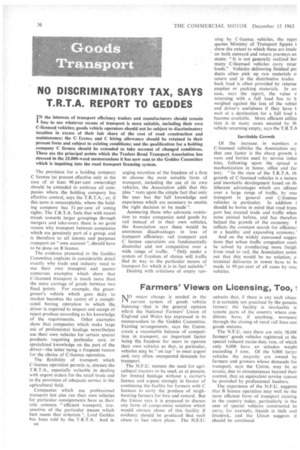Farmers' Views on Licensing, Too, 1
Page 38

If you've noticed an error in this article please click here to report it so we can fix it.
MO major change is needed in the
current system of goods vehicle lieensing--that is the general opinion which the National Farmers' Union of England and Wales has expressed in its memorandum to the Geddes Committee. Existing arrangements, says the Union, create a reasonable balance of competition in transport, an important factor being the freedom for users to operate their own vehicles so that, in particular, vehicles may be "on tap" to meet urgent and, very often. unexpected demands for transport.
The N.F.U. stresses the need for agricultural tractors to be used, as at present. for limited haulage without a carrier's licence and argues strongly in favour of continuing the facility for farmers with C licences to carry the produce of neighbouring farmers for hire and reward. But the Union says it is prepared to discuss any form of compromise solution which would obviate abuse of this facility if evidence should be produced that such abuse in fact takes place. The N.F.U.
submits that, if there is any such abuse it is certainly not practised by the genuint farmer; the facility is invaluable in remote parts of the country where conditions have, if anything, worsened through the closing of rural rail lines and goods stations.
The N.F.U. says there are only 58,000 farmers' goods vehicles registered at the special reduced excise-duty rate, of which only 9,000 have an unladen weight exceeding 3 tons. Of the 9,000 larger vehicles the majority are owned by farmers and growers whose demands for transport, says the Union, may be so erratic, due to circumstances beyond their control, that an equivalent service cannot be provided by professional hauliers.
The experience of the N.F.U. suggests that B licence operation may well be the most efficient form of transport existing in the country today, particularly in the case of special vehicles constructed to carry, for example, liquids in bulk and livestock, and the Union suggests it should be continued.




















































































































